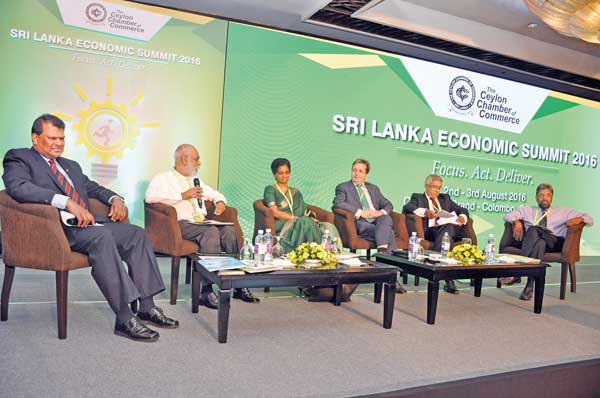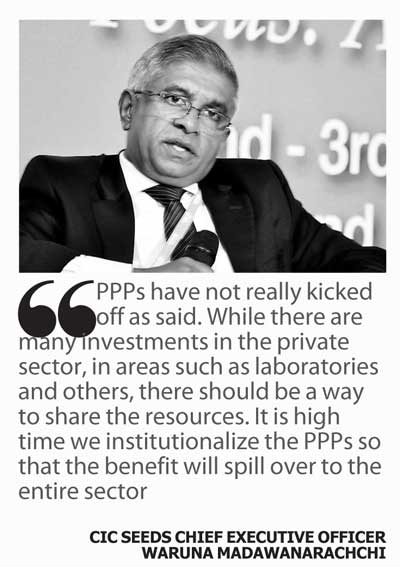Reply To:
Name - Reply Comment
Last Updated : 2024-04-26 02:12:00
 From left: Kelani Valley Plantations Managing Director Roshan Rajadurai , Moderator Dr Anura Ekanayake, Export Development Board Chairperson Indira Malwatte, Duxton Asset Management Managing Director/Chief Investment Officer Desmond Sheehy, CIC Seeds Chief Executive Officer Waruna Madawanarachchi and Science Land Chairman Romesh Dias Bandaranaike
From left: Kelani Valley Plantations Managing Director Roshan Rajadurai , Moderator Dr Anura Ekanayake, Export Development Board Chairperson Indira Malwatte, Duxton Asset Management Managing Director/Chief Investment Officer Desmond Sheehy, CIC Seeds Chief Executive Officer Waruna Madawanarachchi and Science Land Chairman Romesh Dias Bandaranaike
Pic by Nisal Baduge
By Shabiya Ali Ahlam
If one was to briefly describe Sri Lanka’s agriculture sector, it is one that lost in the wilderness, trying to find its way out.
The local agriculture landscape, which consists of domestic and export sub-sectors, remains a vital sector of the economy through the provision of income, employment, foreign exchange, food and raw materials. It also stimulates growth in the rest of the economy via its forward and backward linkages with other economic sectors.
Despite its importance and potential, Sri Lanka is yet to have a sustainable agriculture policy. An implementation of such a policy on the other hand would be a whole new chapter of issues.
A panel discussion at Sri Lanka Economic Summit 2016 that featured industry experts and top government officials highlighted that the issue the sector has been grappling with for decades—since the nation gained independence to be exact— has grown to become even more complicated. Today, it is more diverse in nature compared to those in the plantation-dominated era.
The diversification and complexities can be attributed to matters regarding plantations being increasingly technical and trade oriented, whilst those related to the food crop sector are due to a mix of technical social and political dimensions.
 Contribution to economy
Contribution to economy
Employment wise the sector’s contribution still remains significant, but not necessarily productive. Despite a decline in the employment share with the expansion of the industrial and services sectors in recent years, the agricultural sector absorbs nearly 28.5 percent of the total labour force.
While utilizing 43 percent of the total land area of the country, the sector remains the backbone of the rural economy in Sri Lanka.
According to government statistics, export earnings from agricultural products have been increasing in value terms, with the share of agricultural exports in total exports hovering around 25 percent.
Domestic agriculture still provides approximately 80 percent of Sri Lanka’s food requirement in value terms. However, it is noted that the problem at present is deciding on policy reforms to effectively contribute to sustained growth, while mitigating existing constraints and future challenges.
Limited availability of land
The major problem for years has been in finding suitable lands to establish plantations; later on, it was to improve the profitability of plantations. According to a report by a local think tank, it is noted that focus shifted towards food crops, mainly rice, partly as a result of world food shortages during regional global conflicts of the time, and partly due to the emergence of nationalistic thinking on food self-sufficiency. This resulted in the development of a food crop production sector with heavy support from the state.
 Science Land Chairman Dr. Romesh Dias Bandaranaike while speaking on the need for reforms pointed out that a common misconception is that many opine the plantation sector is “large” and encompasses a significant proportion of the nation’s cultivated land.
Science Land Chairman Dr. Romesh Dias Bandaranaike while speaking on the need for reforms pointed out that a common misconception is that many opine the plantation sector is “large” and encompasses a significant proportion of the nation’s cultivated land.
When looking at the total land in which tea, rubber and coconut is cultivated, it is grown on 793,000 hectares, which is only 17.6 percent of the total cultivated extent. Even in the case of tea, which is grown on a total land area of 203,000 hectares, the plantation percentage of the total crop extent is only 39.7 percent.
“Smallholders are still opening up, but the area under tea is actually declining. Compared with the situation in 1996, there is a 70 percent contraction in the plantation area,” said Bandaranaike.
He added that when the extent of plantation land is taken into account, it is even less significant considering that 775, 000 hectares is allocated for paddy in Sri Lanka.
Measures to boost commercial agriculture
Bandaranaike’s prescription for this endeavour is for all estates to be privatized. He shared that while  the political issue has been fairly understood and managed to some extent by the companies, the estates are very much run down now than they were at the time of original privatization. The estates were first privatized in 1992.
the political issue has been fairly understood and managed to some extent by the companies, the estates are very much run down now than they were at the time of original privatization. The estates were first privatized in 1992.
The plantation areas, which are of about 10,000 hectares per block should be reduced to smaller units, of about 3,000 hectares, Bandaranaike opined. For that to realize, much more investment is required to be pumped so that better use of land is ensured.
The second is that the concept of lease rent should be introduced to encourage work continuity in rundown plantations. The need for lease rent option was justified stating that small local companies are unable to afford outright purchases – therefore this becomes a viable option to ensure land is available for agricultural purposes.
“This is a win-win solution since the planter gets his land for at an affordable value whereas the government will get their revenue,” Bandaranaike opined.
“The last thing you would want is for politically influenced people to capture these lands. Even if the lands are rundown, there are some values that can be stripped from it,” he added.
Thirdly, he stressed that the labourers passed on during the initial privatization must be “freed and cleared”. While the labourers would need to be paid off, he also stated that they would have to be assigned to new groups of privatization.
 Allowing foreign companies to come in was pointed out as the fourth measure. Bandaranaike suggested that they would also need to be provided complete flexibility.
Allowing foreign companies to come in was pointed out as the fourth measure. Bandaranaike suggested that they would also need to be provided complete flexibility.
“People need to be able to do what they like with their land. It doesn’t have to be only in tea, rubber and coconut, but can also be in other agriculture crops. People are not going to take these lands unless they have the freedom as they like.”
Furthermore, he suggested the need for simplification in the leasing process. With every subsequent privatization, more restriction was put on to leases, according to Bandaranaike. A Cabinet Paper has been put forward in this regard but granting flexibility is yet to seen.
Extracting maximum with minimum resources
Planters’ Association of Ceylon Chairman Roshan Rajadurai, who has been advocating for a better working model in the plantation sector, said that after privatization, regional plantation companies (RPCs) have remained with 81 percent of the land and 53 percent of the workers.
Despite the situation, production has improved by 14 percent, a boost that has been achieved by functioning with a workforce that has the lowest individual output in the world even though are paid the highest wages.
“So we have done quite well. We have taken a massive burden out of the hands of the government. It is at least in the current levels due to private sector management,” he asserted.
“It is not an exaggeration to say that we have been facing many challenges in the last few years this has been brought about by external and to some degree, internal reasons. One of the main issues faced is the low productivity and high cost of labour,” he added, while pointing out that 60 percent cost of production is labour related.
 Productivity is way forward
Productivity is way forward
In terms of going forward the RPCs have proposed productivity-based wage than going on with an attendance-based model.
He charged that the wages have been increased over the years due to undue political pressure.
“We can see unsustainable wage levels and we have been making losses. The reason is not only the domestic wages but also due to foreign markets crashing,” he added.
Rajadurai stressed that despite the challenges in the past, plantations have been managed profitably. He implied the need to do away with political interferences so that the businesses could be run in a profitable manner.
“Given a conducive environment and freedom for us to manage the industry in a professional manner, we can look forward to good times,” he pointed out.
Plethora of opportunity but lack of expertise
Starting off with the bright side, Duxton Asset Management Chief Investment Officer/Managing Director Deshmond Sheehy, was optimistic on Sri Lanka’s potential.
“We put our company’s money into Sri Lanka as it is today due to the opportunities we see here. Yes, there are difficulties, yes there is a need to attract money, but this is one of the countries that we have chosen from the lot to put money into because of the opportunities and the progress that we observe,” he said with positivism.
Moving on to the not so bright, Sheehy pointed out that as an investor, it is observed that Sri Lanka lacks operational and management expertise. His experience in the nation states that there is limited knowledge of farming practices that severely impacts the productivity. Alongside this hiccup is noted the lack of expertise in financial resource planning.
While acknowledging that enough human talent can be harnessed in the local context, the biggest challenge Sri Lanka would face in 15 years’ time is that there won’t be any young talent in agriculture.
“People will not know how to grow food. There is a need of people who know farming, who understands it and its techniques.
“Everyone is chasing to be the next IT guy. But we need to look and concentrate and make sure that people are being educated about agriculture and become global experts. This is a fantastic opportunity for a country like Sri Lanka to focus on the expertise in agriculture. You have the ability,” noted Sheehy.
Another key issue he said is lack of capital and infrastructure to support this vital sector. Sheehy stressed that there is “always” going to be an issue in this area and it is essential for the relevant stakeholders to divert their attention so that new mechanisms to address the same in a sustainable manner is conceptualized.
Greater focus on technology
According to CIC Seeds Chief Executive Officer Waruna Madawanarachchi technology would be the answer to majority of the issues faced in commercial agriculture.
“We need to bring in technology. There is no other way to boost productivity. In addition to that, bringing in proper management into commercial agriculture is essential,” he noted.
To ensure that new technology is brought into the sector, the government was urged to revisit some of the regulations and look at means on importing the required technical know-how in a speedy manner.
He also opined that technology must also be used in extending the product to markets. “Farmers must be given the basic knowledge is using technology to communicate better with the markets,” noted Madawanarachchi.
Furthermore, it was suggested that the government must take up a greater role in allowing the flow of technology through private-public partnerships (PPPs), making it readily available to a greater section of the sector.
“PPPs have not really kicked off as said. While there many investments in the private sector, in areas such as laboratories and others, there should be a way to share the resources. It is high time we institutionalize the PPPs so that the benefit will spill over to the entire sector,” suggested Madawanarachchi.
Meanwhile, he stressed that the corporate players must increase their involvement in the supply chain for more benefits to come into agriculture. The CEO also noted that imperative is a paradigm shift in the attitude and thinking of all stakeholders if they want to witness significant positive impacts.
“We need to turn our plans into actions,” he said.
A different viewpoint
While industry representatives suggested a series of measures which according to them would help tackle few of the pressing challenges the agriculture space is faced with, government official Indira Malwatte had a slightly different viewpoint.
The Export Development Board Chairperson, who has hands on experience in the agriculture sector, opined a different approach to what was suggested.
While commercial agriculture is a key area of focus for the government, she opined extending lands to foreign investors is not the best way forward.
Tweaking the suggestions put forward by her fellow panellists in this regard, Malwatte said she has full confidence in the local business persons to manage the lands effectively.
“I am confident there are sufficient Sri Lankan investors who, if given the same terms and conditions of those foreign investors who are trying to move into Sri Lanka, would deliver more or less the same,” she said.
Speaking from her experience where she acknowledged obtaining land in climatic zones is an issue for local investors, she said foreign assistance could be sought in the area of technology and marketing.
“The actual growing part and the land can be given to locals. If the investor is keen, all those facilities are there. We are talking about government bringing technology, I firmly believe that it is the private sector engaged in agriculture who could contribute in this effort,” she added.
Organic farming the way to go
Malwatte opined that organic farming is an area the nation should focus on as it has greater potential. In addition to it being a niche market, it better suits Sri Lanka’s capabilities given that there are limitations in acquiring land and technology.
“Organic farming is something that we have to embrace. In fact, we have become organic by default especially in the spice sector. Most of the home gardens in the up country have been in this. We also have lands in the North and East, which we were not able to cultivate before. Such are ideal for organic farming. We are pressing that the government must not give it to any other farming practices, since organic has much more potential,” explained Malwatte.
In an effort to make organic farming more viable, she shared that the EDB will introduce within the next two months the National Organic Certification Unit (NOCU). The establishment would essentially allow companies who want to be certified to do so through third party registration. The institution aims at bringing down significantly the cost of organic farming certification which currently is expensive.
Better branding
Having initiated Geographical Indication (GI) for cinnamon, the EDB chief shared plans are afoot to have it in place in Europe and few countries in the South Asia region.
A number of issues are faced in international markets since Ceylon cinnamon has not been certified. She added that though Ceylon tea is promoted, the Ceylon brand is now promoted. According to her, measures are being taken by the relevant authorities to promote the Ceylon brand.
While the effort would be carried forward with spices, she shared a proposal has been put forward by the fruit and vegetable sector to have ‘Ceylon Pineapple’.
“We will look to make this a trade mark. We have got the budget for this. It will surely work since our pineapples have very special qualities in the international market,” opined Malwatte.

Add comment
Comments will be edited (grammar, spelling and slang) and authorized at the discretion of Daily Mirror online. The website also has the right not to publish selected comments.
Reply To:
Name - Reply Comment
US authorities are currently reviewing the manifest of every cargo aboard MV
On March 26, a couple arriving from Thailand was arrested with 88 live animal
According to villagers from Naula-Moragolla out of 105 families 80 can afford
Is the situation in Sri Lanka so grim that locals harbour hope that they coul